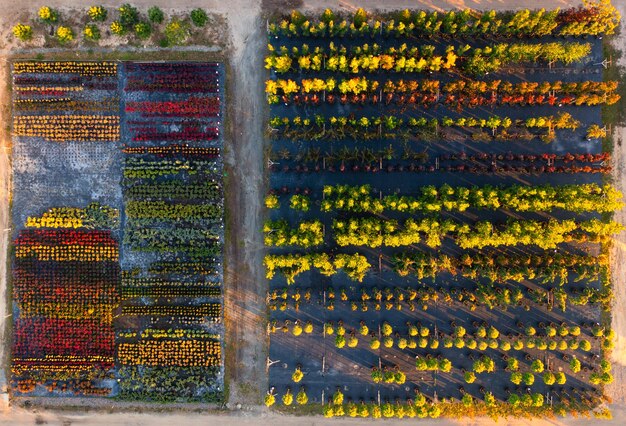Sustainable Agriculture: New Health Benefits Research

Recent research highlights that sustainable agriculture not only protects the environment but also offers significant benefits to human health through improved nutrition, reduced exposure to harmful chemicals, and enhanced food security.
What are the latest research findings on the benefits of sustainable agriculture for human health? Sustainable farming practices are increasingly recognized not just for their environmental advantages, but also for their positive impact on what we eat and how it affects our well-being. Let’s dive into recent studies that illuminate these vital connections.
Understanding Sustainable Agriculture and Its Importance
Sustainable agriculture focuses on farming methods that are ecologically sound, economically viable, and socially just. It aims to produce food and fiber while minimizing negative impacts on the environment and promoting the long-term health of ecosystems.
Key aspects of sustainable agriculture include reducing the use of synthetic pesticides and fertilizers, conserving water and soil, promoting biodiversity, and supporting local economies. These practices not only benefit the environment but also have profound implications for human health.
Defining Sustainable Agriculture
Sustainable agriculture involves adopting farming techniques that protect natural resources and ensure food security for future generations. It emphasizes the interconnectedness of ecological, social, and economic dimensions in agriculture.
Practices such as crop rotation, integrated pest management, and no-till farming are integral to sustainable agriculture, fostering resilience in farming systems.
The Core Principles
Sustainable agriculture revolves around several core principles that ensure long-term viability and minimal environmental impact. These include:
- Ecological Balance: Maintaining and enhancing the ecological balance within agricultural systems is crucial for long-term sustainability.
- Resource Conservation: Efficient use of natural resources like water, soil, and energy is a key component of sustainable agriculture.
- Economic Viability: Sustainable farming must be economically viable for farmers to adopt and maintain these practices.
- Social Equity: Ensuring fair labor practices, supporting local communities, and promoting access to healthy food are important social considerations.
Examples of Sustainable Agriculture Practices
Many innovative practices are being implemented by farmers around the globe to promote sustainability:
- Crop Rotation: Rotating crops can improve soil health, reduce pest and disease pressure, and increase yields.
- Cover Cropping: Planting cover crops helps prevent soil erosion, suppress weeds, and improve soil fertility.
- No-Till Farming: Minimizing soil disturbance reduces erosion, conserves soil moisture, and improves soil structure.
- Integrated Pest Management (IPM): Using a combination of biological, cultural, and chemical controls to manage pests reduces reliance on synthetic pesticides.
In conclusion, understanding the principles and practices of sustainable agriculture is essential for realizing its potential benefits for both the environment and human health. These practices collectively contribute to the creation of a more resilient and healthful food system.
Nutritional Benefits of Sustainable Agriculture
Sustainable agriculture practices can significantly enhance the nutritional value of food. By focusing on soil health and biodiversity, these methods produce crops that are richer in vitamins, minerals, and antioxidants.
Compared to conventional farming, sustainable agriculture often yields foods that are not only safer but also more nutrient-dense, contributing to better health outcomes for consumers.

Enhanced Nutrient Density
Sustainable agriculture prioritizes building healthy soil, which in turn leads to more nutritious crops. Healthy soil contains a diverse community of microorganisms that help plants absorb essential nutrients.
Studies have shown that organically grown produce often contains higher levels of certain vitamins and minerals compared to conventionally grown produce. This is attributed to better soil management practices and reduced use of synthetic fertilizers.
The Role of Soil Health
Healthy soil is the foundation of sustainable agriculture and is vital for producing nutrient-rich foods. The following points highlight the importance of soil health:
- Microbial Activity: A diverse community of soil microbes enhances nutrient cycling and availability to plants.
- Organic Matter: High levels of organic matter improve soil structure, water retention, and nutrient retention.
- Reduced Erosion: Sustainable practices like cover cropping and no-till farming prevent soil erosion, preserving topsoil rich in nutrients.
Specific Nutrients Improved Through Sustainable Practices
Certain nutrients are notably higher in produce grown using sustainable methods. These include:
- Antioxidants: Organically grown fruits and vegetables often have higher levels of antioxidants, which help protect the body against cellular damage.
- Vitamins: Some studies indicate that organic produce can contain higher levels of vitamins such as vitamin C and certain B vitamins.
- Minerals: Sustainable farming practices can increase the mineral content of crops, including essential minerals like iron, zinc, and magnesium.
In summary, the nutritional benefits of sustainable agriculture are evident in the increased nutrient density of crops. By focusing on soil health and biodiversity, sustainable farming produces foods that are not only environmentally friendly but also more beneficial for human health. This shift towards nutrient-rich foods can contribute to improved overall health and well-being.
Reduced Exposure to Harmful Chemicals
One of the most significant health benefits of sustainable agriculture is the reduced exposure to harmful chemicals. Conventional farming often relies heavily on synthetic pesticides, herbicides, and fertilizers, which can pose risks to human health.
Sustainable agriculture minimizes or eliminates the use of these chemicals, thereby reducing the potential for exposure through food, water, and the environment.
The Risks of Synthetic Pesticides
Synthetic pesticides can have adverse effects on human health, including:
- Neurological Effects: Some pesticides can disrupt the nervous system, leading to cognitive and developmental problems, especially in children.
- Endocrine Disruption: Certain pesticides can interfere with the endocrine system, potentially causing hormonal imbalances and reproductive issues.
- Cancer Risk: Long-term exposure to some pesticides has been linked to an increased risk of certain types of cancer.
How Sustainable Agriculture Reduces Chemical Exposure
Sustainable farming practices prioritize natural methods of pest and weed control, thereby reducing the need for synthetic chemicals. This is achieved through:
- Biological Pest Control: Using beneficial insects and other natural predators to control pests.
- Crop Rotation: Rotating crops can disrupt pest cycles and reduce pest infestations.
- Cover Crops: Planting cover crops can suppress weeds and reduce the need for herbicides.
The Impact on Water Quality
The reduced use of synthetic chemicals in sustainable agriculture also benefits water quality. Conventional farming practices can lead to pesticide and fertilizer runoff, contaminating water sources.
By minimizing the use of these chemicals, sustainable agriculture helps protect water resources and ensures access to clean drinking water.
In conclusion, the reduced exposure to harmful chemicals is a major health benefit of sustainable agriculture. By prioritizing natural methods and minimizing the use of synthetic pesticides and fertilizers, sustainable farming protects human health and the environment. This approach leads to safer food, cleaner water, and a healthier overall ecosystem.
Enhanced Food Security and Access
Sustainable agriculture plays a crucial role in enhancing food security and ensuring access to nutritious food for all. By promoting resilient farming systems and supporting local food production, sustainable agriculture helps build a more stable and equitable food supply.
This approach not only addresses immediate food needs but also ensures the long-term sustainability of food production in the face of environmental challenges.
Building Resilient Farming Systems
Sustainable agriculture practices enhance the resilience of farming systems in several ways:
- Diversification: Promoting crop and livestock diversity can reduce vulnerability to pests, diseases, and climate change.
- Soil Health: Healthy soil is more resilient to drought, floods, and other extreme weather events.
- Water Conservation: Efficient water management practices ensure a more reliable water supply for agriculture.
Supporting Local Food Production
Sustainable agriculture often emphasizes local food production, which can improve access to fresh, nutritious food for communities. This can be achieved through:
- Community Gardens: Supporting community gardens provides opportunities for local food production and education.
- Farmers Markets: Farmers markets connect local farmers with consumers, providing access to fresh, seasonal produce.
- Farm-to-Table Initiatives: Farm-to-table programs link local farms with restaurants and institutions, promoting sustainable food systems.

Addressing Food Deserts
Sustainable agriculture can also help address food deserts, which are areas with limited access to affordable and nutritious food. By supporting local food production in these areas, sustainable agriculture can improve food security and health outcomes.
In summary, enhanced food security and access are important benefits of sustainable agriculture. By building resilient farming systems and supporting local food production, sustainable agriculture helps ensure that all people have access to nutritious food. This approach contributes to a more stable, equitable, and sustainable food system.
The Impact on Biodiversity and Ecosystem Health
Sustainable agriculture significantly benefits biodiversity and ecosystem health. By minimizing habitat destruction and promoting diverse farming systems, sustainable agriculture helps protect and enhance natural ecosystems.
This approach not only supports wildlife and plant diversity but also improves the overall health and resilience of agricultural landscapes.
Minimizing Habitat Destruction
Conventional farming practices often involve large-scale monoculture, which can lead to habitat destruction and loss of biodiversity. Sustainable agriculture minimizes habitat destruction by:
- Preserving Natural Habitats: Integrating natural habitats into agricultural landscapes provides refuge for wildlife and beneficial insects.
- Promoting Crop Diversity: Planting a variety of crops creates a more diverse and resilient ecosystem.
- Reducing Chemical Use: Minimizing the use of synthetic pesticides and fertilizers protects beneficial organisms.
Supporting Pollinators
Pollinators, such as bees and butterflies, are essential for agricultural productivity and ecosystem health. Sustainable agriculture supports pollinators by:
- Planting Pollinator-Friendly Crops: Growing crops that provide nectar and pollen for pollinators.
- Creating Pollinator Habitats: Establishing wildflower meadows and other habitats that support pollinators.
- Avoiding Pesticides: Minimizing the use of pesticides that can harm pollinators.
Improving Soil Health
Healthy soil is a critical component of ecosystem health. Sustainable agriculture improves soil health by:
Sustainable agriculture improves soil health by:
- Increasing Organic Matter: Adding organic matter to the soil improves its structure, water retention, and nutrient content.
- Reducing Erosion: Preventing soil erosion protects soil fertility and water quality.
- Promoting Microbial Diversity: Supporting a diverse community of soil microbes enhances nutrient cycling and plant health.
In conclusion, the positive impact on biodiversity and ecosystem health is an important benefit of sustainable agriculture. By minimizing habitat destruction and promoting diverse farming systems, sustainable agriculture helps protect and enhance natural ecosystems. This approach ensures the long-term health and resilience of agricultural landscapes and supports a thriving environment for future generations.
Economic Benefits for Farmers and Communities
Sustainable agriculture not only benefits the environment and human health but also offers significant economic advantages for farmers and communities. By reducing input costs, increasing market opportunities, and supporting local economies, sustainable agriculture can enhance the economic viability of farming operations.
This approach helps create a more resilient and equitable agricultural system that benefits both producers and consumers.
Reducing Input Costs
Sustainable agriculture practices can reduce input costs for farmers in several ways:
- Reduced Chemical Use: Minimizing the use of synthetic pesticides and fertilizers lowers input costs and reduces environmental impacts.
- Water Conservation: Efficient water management practices can reduce water bills and ensure a more reliable water supply.
- Energy Efficiency: Implementing energy-efficient practices, such as using renewable energy sources, can lower energy costs.
Increasing Market Opportunities
There is a growing demand for sustainably produced food, creating new market opportunities for farmers who adopt sustainable practices. These opportunities include:
- Organic Certification: Obtaining organic certification allows farmers to sell their products at premium prices.
- Direct Marketing: Selling directly to consumers through farmers markets and community-supported agriculture (CSA) programs.
- Value-Added Products: Processing raw agricultural products into value-added items, such as jams and sauces.
Supporting Local Economies
Sustainable agriculture can strengthen local economies by:
- Creating Jobs: Sustainable farming practices often require more labor, creating job opportunities in rural communities.
- Keeping Money Local: Supporting local farms keeps money within the community, boosting the local economy.
- Attracting Tourists: Agri-tourism, such as farm tours and U-pick operations, can attract tourists and generate revenue for local businesses.
In summary, the economic benefits for farmers and communities are an important advantage of sustainable agriculture. By reducing input costs, increasing market opportunities, and supporting local economies, sustainable agriculture can enhance the economic viability of farming operations. This approach helps create a more resilient and equitable agricultural system that benefits both producers and consumers.
| Key Point | Brief Description |
|---|---|
| 🌱 Nutritional Benefits | Higher nutrient density in crops due to healthy soil practices. |
| Chemical Reduction | Minimizes exposure to harmful synthetic pesticides and fertilizers. |
| Access to Food | Enhances food security and supports local food production. |
| 🌍 Ecosystem Health | Protects biodiversity and improves ecosystem resilience. |
Frequently Asked Questions
▼
Sustainable agriculture involves farming in ways that protect the environment, support local communities, and ensure long-term food production. It focuses on minimal impact and resource preservation.
▼
It boosts nutrition by promoting soil health, reduces harmful chemical exposure, and enhances food security. Healthier soil results in more nutrient-rich crops for consumption.
▼
Common practices include crop rotation, cover cropping, no-till farming, and integrated pest management. These methods improve soil and minimize the need for synthetic inputs.
▼
Organic farming aligns with sustainable agriculture but includes specific standards for production. While all organic farming is typically sustainable, not all sustainable farming is certified organic.
▼
Support local farmers markets, buy organic products, and explore CSAs. Also, educate yourself on sustainable practices and advocate for supportive policies.
Conclusion
In conclusion, the latest research underscores the multifaceted benefits of sustainable agriculture for human health. From enhancing nutritional value and reducing chemical exposure to strengthening food security and supporting ecosystem health, sustainable farming practices offer a pathway to a healthier, more resilient future for both people and the planet. Embracing these methods is essential for creating a sustainable food system that nourishes communities and protects the environment for generations to come.





